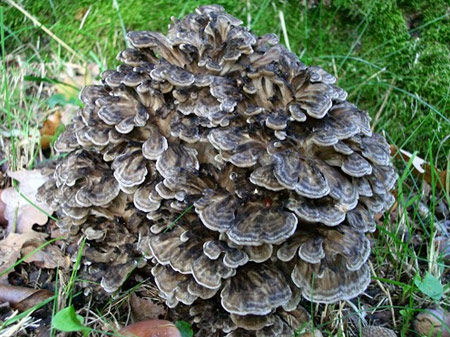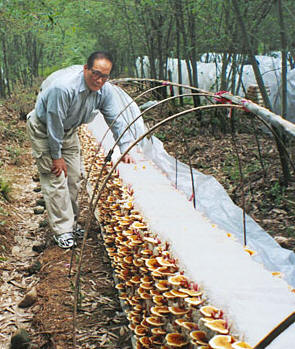
Latijnse naam: Grifola frondosa
Andere namen: maitake, Hen-of-the-Woods, Ram's head, Sheep's head (Engels), Klapperschwamm, Laubporling, Maitake (Duits), Grifola frondosa (Frans)
Actieve componenten: polysacchariden (beta 1.3 en 1.6 glucanen), heteroglycanen, steryl lipides en sterylglycosides (ergosterol (vitamine D2), fungisterol), vanadium, kalium, calcium, magnesium, vitamine B2, aminozuren
De mai-take is een paddenstoel die van oorsprong in Japan en Noord Amerika groeit. In Japan wordt de mai-take beschouwd als een lekkernij en wordt in veel gerechten verwerkt. In het Japans betekent mai-take letterlijk "dansende paddenstoel", het verhaal gaat dat de Middeleeuwse Japanners zo blij waren als ze deze paddenstoel vonden dat ze gingen dansen aangezien de paddenstoel op gewichtbasis de tegenwaarde van zilver had (!). Een ander verhaal stelt dat de naam afkomstig is van de groeiwijze, die is namelijk over elkaar heen zodat het met een beetje fantasie lijkt op vlinders in een pose die aan dansen doet denken.
In de Chinese en Japanse geneeskunde wordt mai-take al vele eeuwen gebruikt. Zoals voor veel medicinale paddenstoelen geldt ook hier de sterke immuunsysteem versterkende eigenschappen (ref: 33,34,35 en 39). Daarnaast is de mai-take rijk aan vanadium,kalium, calcium, magnesium, vitamine B2, vitamine D, aminozuren en beta glucanen (ref: 39,40 en 41). Ook wordt de paddenstoel ingezet om het cholesterolniveau te verlagen (ref: 1 t/m 5 en 32).
Door wetenschappers wordt aangenomen dat de immuunsysteem activiteit van mai-take voortkomt uit het vermogen om diverse cellen te activeren waaronder macrofagen, natural killer cellen en T- cellen alsmede interleukine-1 en superoxide anionen (ref: 23,42,43 en 44).
Sinds een tiental jaren wordt er in het Westen onderzoek gedaan naar de medicinale eigenschappen van paddenstoelen waaronder de mai-take. Dit is ingegeven door het feit dat in de Chinese en Japanse geneeskunde paddenstoelen al duizenden jaren worden gebruikt bij diverse ziekten waaronder kanker. In Japan en China bestaan geregistreerde geneesmiddelen die gebaseerd zijn op paddenstoelen(extracten). Helaas is veel onderzoek nog in het Chinees en Japans en nog niet vertaald. De Westerse geneeskunde heeft echter veel belangstelling voor de toepassingen uit het verre Oosten en uit divers onderzoek blijkt dat de stoffen uit paddenstoelen als de mai-take goed kunnen worden ingezet bij een gecombineerde chemotherapie. De immuunsysteemversterkende eigenschappen maken dat de chemotherapie ook beter wordt verdragen.
Toepassing Mai-take in TCM (Traditional Chinese Medicine)
| TCM naam | Huishuhua, Keisho (Chinees) |
| Smaak | Zoet |
| Werking | Longen, nieren, darmen |
| Toepassing | Neutraal |
Bestaand wetenschappelijk onderzoek
| Gebied | Onderzoek |
| Afweersysteem | 32,33,34,35 |
| Anti viraal | 36 |
| Anti tumor/kanker | 9,10,11,12,13,14,15,16,17,18,19,20,21,22,23,24,25,26,27,28,29,30,31 |
| Glucose niveau | 28 |
| Bloeddruk | 1,2,3 |
| Cholesterol | 1,2,3,4,5,28,32,41 |
| Ontstekingsremmend | 7 |
| Anti coagulantie | |
| Diabetes | |
| Leverbescherming | |
| Allergie | |
| Longaandoeningen | |
| Huidproblemen | |
| Uithoudingsvermogen |
Wetenschappelijk onderzoek Mai-take - 44 beschikbare referenties
- Kabir Y, Yamaguchi M, Kimura S. Effect of shiitake (Lentinus edodes) and maitake (Grifola frondosa) mushrooms on blood pressure and plasma lipids of spontaneously hypertensive rats. J Nutr Sci Vitaminol (Tokyo). 1987 Oct;33(5):341-6. PMID: 3443885
- Kabir Y, Kimura S. Dietary mushrooms reduce blood pressure in spontaneously hypertensive rats (SHR). J Nutr Sci Vitaminol (Tokyo). 1989 Feb;35(1):91-4. PMID: 2738717
- Fukushima M, Ohashi T, Fujiwara Y, Sonoyama K, Nakano M. Cholesterol-lowering effects of maitake (Grifola frondosa) fiber, shiitake (Lentinus edodes) fiber, and enokitake (Flammulina velutipes) fiber in rats. Exp Biol Med (Maywood). 2001 Sep;226(8):758-65. PMID: 11520942
- Rop O, Mlcek J, Jurikova T. Beta-glucans in higher fungi and their health effects. Nutr Rev. 2009 Nov;67(11):624-31. PMID: 19906249
- Driscoll M, Hansen R, Ding C, Cramer DE, Yan J. Therapeutic potential of various beta-glucan sources in conjunction with anti-tumor monoclonal antibody in cancer therapy. Cancer Biol Ther. 2009 Feb;8(3):218-25. Epub 2009 Feb 3. PMID: 19106638
- Vetvicka V, Vashishta A, Saraswat-Ohri S, Vetvickova J. Immunological effects of yeast- and mushroom-derived beta-glucans. J Med Food. 2008 Dec;11(4):615-22. PMID: 19053851
- Yu S, Weaver V, Martin K, Cantorna MT. The effects of whole mushrooms during inflammation. BMC Immunol. 2009 Feb 20;10:12. PMID: 19232107
- Chang R. Functional properties of edible mushrooms. Nutr Rev. 1996 Nov;54(11 Pt 2):S91-3. PMID: 9110582
- Jiang J, Sliva D. Novel medicinal mushroom blend suppresses growth and invasiveness of human breast cancer cells. Int J Oncol. 2010 Dec;37(6):1529-36. PMID: 21042722
- Martin KR, Brophy SK. Commonly consumed and specialty dietary mushrooms reduce cellular proliferation in MCF-7 human breast cancer cells. Exp Biol Med (Maywood). 2010 Nov 1;235(11):1306-14. Epub 2010 Oct 4.PMID: 20921274
- Han SS, Cho CK, Lee YW, Yoo HS. Antimetastatic and immunomodulating effect of water extracts from various mushrooms. J Acupunct Meridian Stud. 2009 Sep;2(3):218-27. PMID: 20633495
- Masuda Y, Ito K, Konishi M, Nanba H. A polysaccharide extracted from Grifola frondosa enhances the anti-tumor activity of bone marrow-derived dendritic cell-based immunotherapy against murine colon cancer. Cancer Immunol Immunother. 2010 Oct;59(10):1531-41. Epub 2010 Jun 20. PMID: 20563803
- Kodama N, Mizuno S, Nanba H, Saito N. Potential antitumor activity of a low-molecular-weight protein fraction from Grifola frondosa through enhancement of cytokine production. J Med Food. 2010 Feb;13(1):20-30. PMID: 20136432
- Masuda Y, Matsumoto A, Toida T, Oikawa T, Ito K, Nanba H. Characterization and antitumor effect of a novel polysaccharide from Grifola frondosa. J Agric Food Chem. 2009 Nov 11;57(21):10143-9. PMID: 19839588
- Louie B, Rajamahanty S, Won J, Choudhury M, Konno S. Synergistic potentiation of interferon activity with maitake mushroom d-fraction on bladder cancer cells. BJU Int. 2010 Apr;105(7):1011-5. Epub 2009 Sep 4. PMID: 19735256
- Shomori K, Yamamoto M, Arifuku I, Teramachi K, Ito H. Antitumor effects of a water-soluble extract from Maitake (Grifola frondosa) on human gastric cancer cell lines. Oncol Rep. 2009 Sep;22(3):615-20. PMID: 19639212
- Ito K, Masuda Y, Yamasaki Y, Yokota Y, Nanba H. Maitake beta-glucan enhances granulopoiesis and mobilization of granulocytes by increasing G-CSF production and modulating CXCR4/SDF-1 expression. Int Immunopharmacol. 2009 Sep;9(10):1189-96. Epub 2009 Jun 30. PMID: 19573626
- Deng G, Lin H, Seidman A, Fornier M, D'Andrea G, Wesa K, Yeung S, Cunningham-Rundles S, Vickers AJ, Cassileth B. A phase I/II trial of a polysaccharide extract from Grifola frondosa (Maitake mushroom) in breast cancer patients: immunological effects. J Cancer Res Clin Oncol. 2009 Sep;135(9):1215-21. Epub 2009 Mar 1.PMID: 19253021
- Masuda Y, Inoue M, Miyata A, Mizuno S, Nanba H. Maitake beta-glucan enhances therapeutic effect and reduces myelosupression and nephrotoxicity of cisplatin in mice. Int Immunopharmacol. 2009 May;9(5):620-6. Epub 2009 Feb 26. PMID: 19249389
- Konno S. Synergistic potentiation of D-fraction with vitamin C as possible alternative approach for cancer therapy. Int J Gen Med. 2009 Jul 30;2:91-108. PMID: 20360893
- Rajamahanty S, Louie B, O'Neill C, Choudhury M, Konno S. Possible disease remission in patient with invasive bladder cancer with D-fraction regimen. Int J Gen Med. 2009 Jul 30;2:15-7. PMID: 20360882
- Pyo P, Louie B, Rajamahanty S, Choudhury M, Konno S. Possible immunotherapeutic potentiation with D-fraction in prostate cancer cells. J Hematol Oncol. 2008 Dec 4;1:25. PMID: 19055833
- Masuda Y, Murata Y, Hayashi M, Nanba H. Inhibitory effect of MD-Fraction on tumor metastasis: involvement of NK cell activation and suppression of intercellular adhesion molecule (ICAM)-1 expression in lung vascular endothelial cells. Biol Pharm Bull. 2008 Jun;31(6):1104-8. PMID: 18520039
- Konno S. Effect of various natural products on growth of bladder cancer cells: two promising mushroom extracts. Altern Med Rev. 2007 Mar;12(1):63-8.
- Kodama N, Murata Y, Asakawa A, Inui A, Hayashi M, Sakai N, Nanba H. Maitake D-Fraction enhances antitumor effects and reduces immunosuppression by mitomycin-C in tumor-bearing mice. Nutrition. 2005 May;21(5):624-9. PMID: 15850970
- Kodama N, Komuta K, Nanba H. Effect of Maitake (Grifola frondosa) D-Fraction on the activation of NK cells in cancer patients. J Med Food. 2003 Winter;6(4):371-7. PMID: 14977447
- Lin H, She YH, Cassileth BR, Sirotnak F, Cunningham Rundles S. Maitake beta-glucan MD-fraction enhances bone marrow colony formation and reduces doxorubicin toxicity in vitro. Int Immunopharmacol. 2004 Jan;4(1):91-9. PMID: 14975363
- Li X, Rong J, Wu M, Zeng X. [Anti-tumor effect of polysaccharide from Grifola frondosa and its influence on immunological function] Zhong Yao Cai. 2003 Jan;26(1):31-2. PMID: 12858772
- Kodama N, Komuta K, Sakai N, Nanba H. Effects of D-Fraction, a polysaccharide from Grifola frondosa on tumor growth involve activation of NK cells. Biol Pharm Bull. 2002 Dec;25(12):1647-50. PMID: 12499658
- Finkelstein MP, Aynehchi S, Samadi AA, Drinis S, Choudhury MS, Tazaki H, Konno S. Chemosensitization of carmustine with maitake beta-glucan on androgen-independent prostatic cancer cells: involvement of glyoxalase I. J Altern Complement Med. 2002 Oct;8(5):573-80. PMID: 12470438
- Yang D, Li S, Wang H, Li X, Liu S, Han W, Hao J, Zhang H. [Prevention of postoperative recurrence of bladder cancer: a clinical study] Zhonghua Wai Ke Za Zhi. 1999 Aug;37(8):464-5. PMID: 11829890
- Mayell M. Maitake extracts and their therapeutic potential. Altern Med Rev. 2001 Feb;6(1):48-60. PMID: 11207456
- Ragupathi G, Yeung KS, Leung PC, Lee M, Lau CB, Vickers A, Hood C, Deng G, Cheung NK, Cassileth B, Livingston P. Evaluation of widely consumed botanicals as immunological adjuvants. Vaccine. 2008 Sep 2;26(37):4860-5. Epub 2008 Jul 18. PMID: 18640165
- Wu MJ, Cheng TL, Cheng SY, Lian TW, Wang L, Chiou SY. Immunomodulatory properties of Grifola frondosa in submerged culture. J Agric Food Chem. 2006 Apr 19;54(8):2906-14. PMID: 16608207
- Kodama N, Murata Y, Nanba H. Administration of a polysaccharide from Grifola frondosa stimulates immune function of normal mice. J Med Food. 2004 Summer;7(2):141-5. PMID: 15298759
- Kodama N, Yamada M, Nanba H. Addition of Maitake D-fraction reduces the effective dosage of vancomycin for the treatment of Listeria-infected mice. Jpn J Pharmacol. 2001 Dec;87(4):327-32. PMID: 11829152
- Chen JT, Tominaga K, Sato Y, Anzai H, Matsuoka R. Maitake Mushroom (Grifola frondosa) Extract Induces Ovulation in Patients with Polycystic Ovary Syndrome: A Possible Monotherapy and a Combination Therapy After Failure with First-Line Clomiphene Citrate. J Altern Complement Med. 2010 Oct 29. [Epub ahead of print]PMID: 21034160
- Preuss HG, Echard B, Bagchi D, Perricone NV. Maitake mushroom extracts ameliorate progressive hypertension and other chronic metabolic perturbations in aging female rats. Int J Med Sci. 2010 Jun 7;7(4):169-80. PMID: 20567593
- Lindequist U, Rausch R, Füssel A, Hanssen HP. [Higher fungi in traditional and modern medicine] Med Monatsschr Pharm. 2010 Feb;33(2):40-8. PMID: 20184262
- Figlas D, Oddera M, Curvetto N. Bioaccumulation and bioavailability of copper and zinc on mineral-enriched mycelium of Grifola frondosa. J Med Food. 2010 Apr;13(2):469-75. PMID: 20132038
- Cui B, Han L, Qu J, Lv Y. Hypoglycemic activity of Grifola frondosa rich in vanadium. Biol Trace Elem Res. 2009 Nov;131(2):186-91. Epub 2009 Mar 13. PMID: 19283341
- Adachi K, Nanba H, Kuroda H. Potentiation of host-mediated antitumor activity in mice by beta glucan obtained from Grifola frondosa (maitake). Chem Pharm Bull 1987;35:262-70.
- Kubo K, Aoki H. Nanba H. Anti-diabetic activity present in the fruit body of Grifola frondosa (Maitake). Biol Pharm Bull 1994;17:1106-10.
- Horio H, Ohtsuru M. Maitake (Grifola frondosa) improve glucose tolerance of experimental diabetic rats. J Nutr Sci Vitaminol 2001;47:57-63.




